- Home
- Jessica Day George
The Rose Legacy Page 2
The Rose Legacy Read online
Page 2
The train was slowing down. They had reached the Wall.
3
STRANGE NEW WORLD
All Coronami children learned of the great plague that decimated their kingdom—a plague caused by creatures called horses that the backward northern people used instead of oxen. The plague had killed off most of the horses, along with thousands of people, yet the northerners refused to destroy the rest of the infected animals. King Kalabar, the Great Defender, built the Wall to create a barrier between civilized folk and the northerners and their animals, which soon died anyway. In the centuries since, any unwanted elements that had plagued Coronam had been exiled beyond its massive stones. And now Anthea was joining them.
The Wall itself was tall and rough and forbidding, she found as she disembarked at the tiny station. The only other thing for miles around, besides the gatehouse, was the small train station. Both were made of the same dark-gray stone as the Wall.
Two mailbags were handed to the stationmaster, a taciturn man in a worn blue suit, and two mailbags were given to the porter in turn. He loaded them onto the train, deposited Anthea’s trunk at her feet, tipped his cap, and left. The stationmaster also tipped his cap to her, then took the mail inside the station house and closed the door.
It was dark and cold. Anthea pulled her coat—best navy-blue wool with staghorn buttons, as required for those attending Miss Miniver’s—closer around her and stamped her feet in their leather boots to keep her blood flowing. Her uncle Andrew knew she was coming; after all, he had purchased her ticket! Why was no one here to meet her?
After an interminable amount of time that the station clock somehow only marked as half an hour, she decided to force her way into the station house. But then she heard a growling and clanking that seemed to indicate a vehicle was coming.
“Finally!” Anthea exclaimed, then schooled her expression into polite patience, as though she weren’t cold and tired and worried.
Into the circle of lantern light came a vehicle of dubious origin. Anthea could not tell if it was merely very, very old or cobbled together out of spare parts or both. It seemed to be some sort of motorcar, but between the mismatched wheels and the wooden cart bench that served as a seat, she wasn’t actually sure.
It pulled up alongside the platform. The man driving clucked his tongue and then looked around, said “Whoa!” and finally turned off the engine.
“Not my first choice, but it does in a pinch!”
It took Anthea a moment to sort through his accent. Then she had to avert her eyes as he clambered up on the platform beside her. From the waist up he was dressed like a country gentleman in a felted jacket, white shirt, and knitted tie, with a hat bearing a small cockade of brown feathers. But below that he only wore a scarlet kilt, which showed his gnarled knees above gray wool socks and thick-soled ankle boots.
“Bit tired, Miss Thea?” The man said it with real concern, cocking his head to one side as he studied her downturned face. “Terrible journey, I’m sure. Here.”
Before she could protest, he leaped down to the cobblestones again, grabbed her by the waist, and swung her onto the seat of the car. She sat, stunned, while he put her trunk, hamper, and the satchel containing her books into the wooden-sided back of the contraption.
The gnarled man hopped nimbly onto the seat beside her while she was still arranging her coat around her. He pressed the starter and jiggled the wheel, clucking his tongue. He pumped the pedals and pressed the starter again. The odd little car coughed and shuddered but didn’t move.
“This isnae my sort of travel,” the man said.
“You have to … you put your foot on …”
Anthea stopped, flustered. She knew she shouldn’t contradict her elders, but Miss Miniver had made sure that her students could all operate a motorcar, in case they were ever without a professional driver for some reason.
“Ah, that’s the thing!”
The man finally got the car started, and they lurched forward. All Anthea could do was hang on as the rackety machine was turned around and headed for the gate in the Wall.
“Don’t remember me, do ye?” the man shouted over the noise of the engine.
“I beg your pardon?”
“Don’t remember me, eh? Eh?”
“I’m afraid I don’t,” Anthea admitted. She searched the weathered profile. “Should I? Sir?”
“I’m Caillin MacRennie,” he said. “And that’s why everyone calls me Caillin MacRennie!” He laughed. “I knew ye when ye were no more’n a babby.”
“You did?” This information drew even more of Anthea’s attention from the blackness of the Wall looming ahead of them. “Did you live in Bellair?”
“Bellair? Nay!” He snorted at the very idea. “Never been farther south than Blackham in my life!”
“Then I’m afraid that you are mistaken, sir,” Anthea said as they stopped at the gatehouse in the shadow of the wall. “I’ve never been farther north than Harkham until today.” Harkham was almost a hundred miles to the south.
“Or so they told ye,” Caillin MacRennie said with another snort before he called over to the gatehouse. “Hi, there! Comin’ back through!”
“Quick enough trip,” said a broad man in a gray army uniform who came out of the little stone house. “Was it even worth dusting off this old relic?”
He made as if to kick one of the tires of their vehicle, but he stopped when he saw Anthea. He tipped his cap to her.
“Evening, miss!”
“Good evening, sir,” she said. “My name is Anthea Thornley.” She thought that she was supposed to have some sort of paper to show, but none had been given to her. “I’m afraid I haven’t any documents with me …”
“I know, miss,” the guard said genially. “Caillin MacRennie explained everything on his way through.” He tipped his cap again. “Welcome home, miss.”
“Um, thank you …?” Anthea was too tired to find a nice way to correct him.
“Oh, and here,” the guard said. He handed Anthea a small brown paper bag. “A little something to appease those monsters at the farm,” he said with a wink and a theatrical shudder.
“Pardon?” Anthea let the bag slither off her lap onto the floor of the car. “The … monsters?”
“Ought to come see the monsters,” Caillin MacRennie said. “They could thank ye for the sugar in person!”
“We’ll see,” the guard said with false sincerity. “But I feel like once was more than enough.”
Both men laughed as the iron portcullis clanked upward. The little car passed through the stone tunnel that led from Kalabar’s Wall into the wilderness, and Anthea gripped the wooden edge of her seat tightly, the bag of sugar cubes forgotten at her feet.
“So these are the Exiled Lands,” she said, trying to distract herself.
“Or Leana, as we call it,” Caillin MacRennie replied dryly. “Welcome back, Miss Thea.”
“Leana? I thought that was just a myth,” Anthea said, her voice faint. “I’m afraid that I’ve never been here either way. You must be mistaken about having known me as a babb—baby, sir.”
Caillin MacRennie let out a braying laugh. “I’m no so old! What lies have they been feeding ye down south, anyway? You’re Leanan born: Why d’ye think ye didn’t need any festerin’ papers to leave the precious Crown lands?”
Anthea simply could not let his disparaging tone go unpunished. She drew herself upright on the hard seat. “Coronam is my home, sir, and even on this side of Kalabar’s Wall, she is still your sovereign nation! I find your disrespectful tone in extremely poor taste.”
Caillin MacRennie did not comment on this but pushed hard on one of the pedals to make the car jolt along faster. They rode in silence for quite a while, through a dark countryside not much different from that on the other side of the Wall. Anthea soon deflated, however, knowing that she had been altogether too abrupt, even rude. Still, she had been in the right to take him to task for his unpatriotic comment, so she did not apologize. But s
he did ask about the lights.
They had passed a few lights here and there: farmhouses, she had guessed. The occasional public building even. But ahead of them was a glow that looked like it came from more than just a single lantern or farmhouse window.
“That’d be Last Farm,” he said.
“The last farm?” she repeated, puzzled.
Caillin MacRennie didn’t answer, but he smiled. He cranked the wheel and they turned up a long lane. It was narrow but smoothly paved, and tall posts hung with lanterns had been placed all along it. Beyond the pools of light were wide pastures.
There were animals in some of the pastures. Large ones, but the light wasn’t strong enough for Anthea to see if they were oxen or merely cows. She could hear the voices of men calling out as they moved among the animals, herding them toward a long, low building that was unlike any barn she had ever seen.
It had brightly lit windows and was made of gray stone. As she peered through the dimness at it, she caught the scent of hay and something else. Oats? She had never really thought about what oats smelled like, outside of porridge. But now she could smell them, almost taste them. And she felt warm, even though a chill drizzle was falling.
The feeling of warmth, the taste of oats and hay, it all grew around Anthea until she thought she would choke on it. There was a smell, too, a smell that reminded her of something, but she couldn’t think what. She wasn’t sure if the smell was pleasant or unpleasant, but she put her handkerchief over her nose and mouth all the same.
A tremble began in her hands and spread up her arms and down her legs. At last the motorcar reached a wide cobbled courtyard in front of an enormous, rambling manor house. It had a high slate roof and a wide front door painted bright blue.
The elegant appearance of the manor took Anthea by surprise, to say the least. So, too, did the inhuman scream that came from off to the right, beyond one of the white fences. Anthea’s head whipped around, and she saw a massive shape rear up, far taller than a man, in the darkness.
“Wh-wh-what is it?” Anthea said.
“Oh, just Con sayin’ hello,” said Caillin MacRennie. “Or rather, sayin’ it’s his land, and you smell diff’rent.”
“Con? But what is it?”
Because now, in the light of the lamps, Anthea could make out other shapes. Men were moving around in the fields, along with animals, massive things that she couldn’t quite see clearly in the darkness.
The wind carried more scents to her: Grass. Muddy earth. And that other smell. The smell of these animals. Memories began to stir in her brain. Con screamed again.
“Horses. Those are horses,” Anthea said faintly.
“O’course they are,” Caillin MacRennie said, and laughed. “What did you think they were: rats?”
“They’re supposed to be dead,” Anthea said.
“Now, who told you that?” Caillin MacRennie said.
“Everyone,” Anthea said. “Everyone knows. The diseases. The plagues.”
She pressed her handkerchief even more tightly over her mouth. How soon would they make her sick?
“Miss Thea? Are you all right?”
Before she could even think of how to answer, a tall, broad-shouldered man came out of the manor to meet them. He had thick brown hair, gray at the temples, and was quite handsome. He looked so very familiar, in a way that was much more welcome than the horses.
With a little sob, Anthea flung herself out of the cart and into his arms.
“Oh, Papa! Help me,” she wailed.
The man hugged her for a moment, and then he gently held her out at arm’s length. “It’s me, your uncle Andrew,” he said kindly. “Welcome back to Last Farm, Thea dear.”
FLORIAN
The wind curled through the evening air and wandered into the eastern paddock. It brought many scents with it: smoke from the lanterns hanging along the drive and outside the stable, men in heavy boots sweating despite the chill in the air, a coming frost, the meats and baked things that had been dinner at the Big House.
And one more smell.
One tiny thread of scent that would not cause another horse to so much as flick an ear in response. But when it reached Florian’s nostrils, his entire body went rigid.
She had returned.
Over a decade’s absence made no difference. Florian knew that it was she.
He smelled soap with roses in it, a hint of fresh bread, something that made him think of the color blue. Florian strained over the fence as far as he could, nostrils flared to gather in every particle of the scent, to make certain that it was not lies or madness. A voice came on the wind: older, deeper, yet hers all the same. His ears swiveled and pricked, hungry for every word.
“Come along, come along!”
A man, impatient, at his shoulder. Florian did not move. The man prodded him, trying to make him turn, but he would not move. The man climbed onto the lower rungs of the fence to reach his halter, and still Florian ignored him. He must not go to the stable, unless that was where she was going. He yanked his head free, and strained again to hear or see or smell where she might be. There was a commotion near the front of the Big House, but it died down quickly, and her scent faded.
Pain filled him, as sharp as it had been when she first left. Why did she not come to him? Why did she go to the Big House, where he was not? Anger followed the pain, anger at the men who he knew had pushed her away, who would not let her come to the paddock.
When the man grabbed Florian’s halter, he yanked his head away, rearing and screaming in challenge. The man scrambled out of the way of Florian’s hooves, and he called for help. Other men came running, but Florian ignored them. He ran to the open gate of the paddock and through it, clattering across the packed earth of the stable yard. If they would not let her come to him, he would go to her.
Before he could get to the Big House, though, another man stepped in front of him. It was The Thornley, and Florian skidded to a stop. The Thornley was the men’s herd stallion, and Florian would not disobey him. Even so, he trembled with rage and anguish while The Thornley took hold of Florian’s halter and led him to the stable.
Florian bared his teeth at the man who came to feed him after The Thornley had gone, and the man gave him his oats and left. Good. Florian did not want him in the way. She would come to him soon, and he didn’t want the man there.
Florian lipped at the oats, drank a little water, but could not settle down. When would she come?
Beloved Anthea.
At last she had returned to him.
4
RUDE AWAKENING
Anthea decided to lie in bed until her humiliation faded from everyone’s mind. Years if need be. The good news was that she would never have to unpack.
She pulled the comforter up to her nose and blocked the light coming in through the flimsy muslin curtains with her arm. The room was very pretty, now that she was looking around. It was furnished with elegant mahogany pieces; the bed was a massive four-poster with a canopy of white muslin. The dresser had a marble top and an oval mirror, and there was a fireplace with a velvet-upholstered wing chair pulled up to it. Anthea had never had her own fireplace before, let alone a big cozy chair that she could curl up in to read.
That was, if she stayed. Right now she was too humiliated. She had flung herself at her uncle like an insane person, called him Papa, and burst into tears when he corrected her. He had carried her like a child to this room, while a veritable army of rough-looking men looked on. And then a tall Kirbinish woman in a starched apron had undressed her, given her a sponge bath, and put her in a strange nightgown. Embarrassed almost beyond words, Anthea had tried to protest, but the woman merely smiled and kept on washing her.
It went beyond humiliation now that she thought of it again. She would have to leave. There was no way she could face her uncle and his people.
And to make everything so much worse, the fields outside were full of horses.
“You’re awake!” a voice called from the door
way. “Finally! I’ve been waiting hours!”
Anthea didn’t recognize the voice. It was female, but young—not the woman from last night. Was there another young lady in residence? Had she witnessed Anthea’s behavior of the night before?
Anthea’s cheeks flamed again, and she almost pulled the comforter over her head. Almost, but not quite. The other girl knew she was here; hiding would only compound Anthea’s list of embarrassing behaviors.
Tentatively, Anthea raised herself out of the nest of bedding. Standing at the foot of the bed was a girl about her own age, with huge blue eyes and a tousled mass of curly brown hair so short that it didn’t even reach her chin. She was clad in an outlandish suit of clothing that Anthea realized after a moment was a pair of men’s pajamas—of maroon paisley silk! There was rouge on her cheeks, and the pajama pants were tucked into a pair of shiny black boots like the kind that soldiers wore. Forgetting her determination to act like a young lady, Anthea simply gaped.
“It’s really you!” the girl squealed, and then jumped over the footboard and onto the bed, boots and all. Anthea barely drew her legs back in time to avoid being crushed. “At last! I’ve missed you so much!” And the girl threw her arms around Anthea’s neck and planted a kiss on her cheek.
Yet another person who thought that she had known Anthea before!
Anthea drew back from the girl’s embrace. “I am sorry,” she said, with the firm tone that Miss Miniver had taught her pupils to use when speaking to overly forward strangers. “But I’m afraid you are mistaken. I would surely remember if we had ever met before.”
The other girl looked baffled by Anthea’s stiff reply.
“Of course we’ve met! Don’t you remember sneaking into each other’s rooms at night? And the first time Daddy put us on a horse? We both got to sit on Constantine together! But now I’m not even allowed to touch Con,” she chattered on. “No one can, except Finn, but he still can’t ride him. Con’s the herd stallion since Justinian died, and I can’t wait for you to see him! We can look even if we can’t pet …” The girl trailed off when she saw Anthea’s horrified expression.

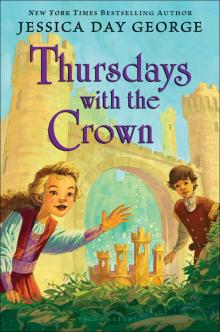 Thursdays With the Crown
Thursdays With the Crown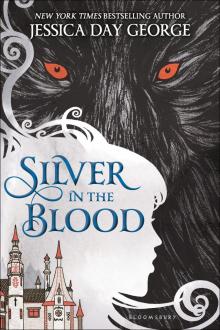 Silver in the Blood
Silver in the Blood Saturdays at Sea
Saturdays at Sea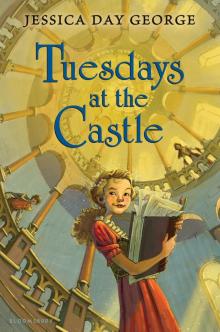 Tuesdays at the Castle
Tuesdays at the Castle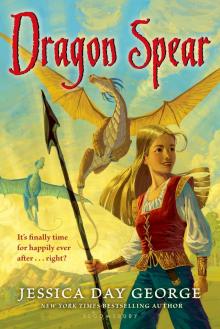 Dragon Flight
Dragon Flight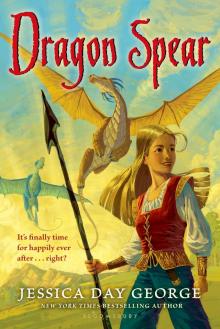 Dragon Spear
Dragon Spear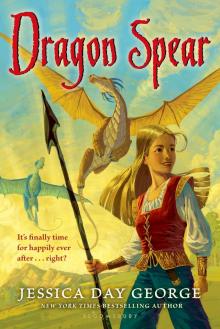 Dragon Slippers
Dragon Slippers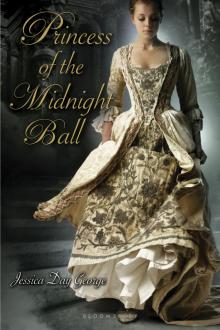 Princess of the Midnight Ball
Princess of the Midnight Ball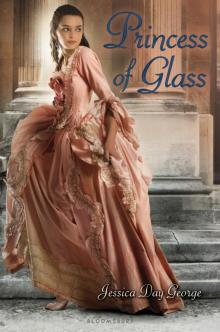 Princess of Glass
Princess of Glass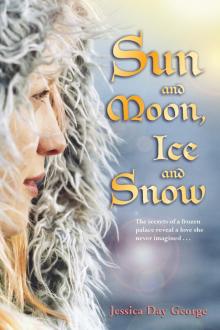 Sun and Moon, Ice and Snow
Sun and Moon, Ice and Snow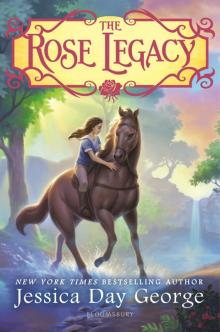 The Rose Legacy
The Rose Legacy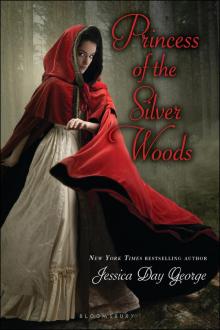 Princess of the Silver Woods
Princess of the Silver Woods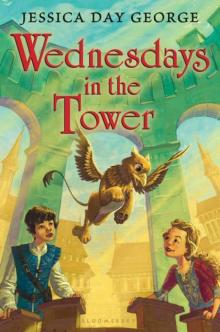 Wednesdays in the Tower
Wednesdays in the Tower The Queen's Secret
The Queen's Secret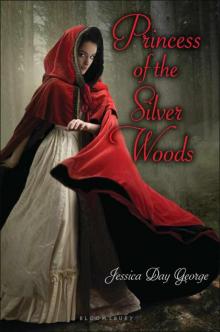 Princess of the Silver Woods (Twelve Dancing Princesses)
Princess of the Silver Woods (Twelve Dancing Princesses)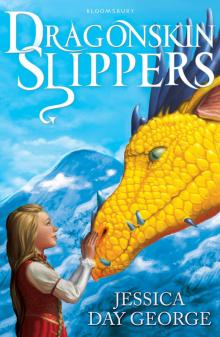 Dragonskin Slippers
Dragonskin Slippers